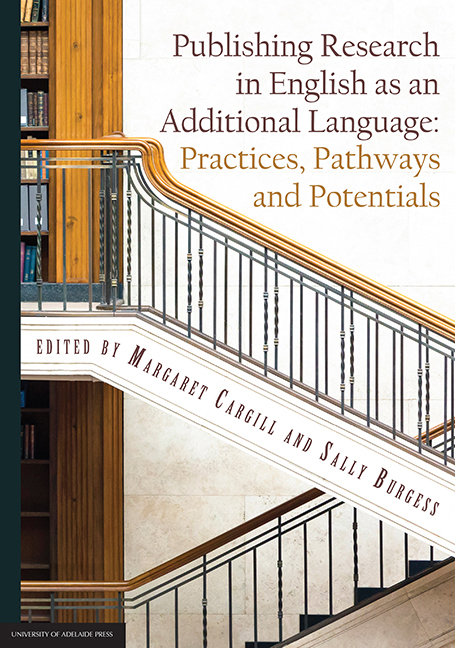Book contents
- Frontmatter
- Contents
- List of contributors
- Acknowledgements
- Foreword
- Introduction: Unpacking English for Research Publication Purposes [ERPP] and the intersecting roles of those who research, teach and edit it
- 1 Accept or contest: A life-history study of humanities scholars’ responses to research publication policies in Spain
- 2 Introducing research rigour in the social sciences: Transcultural strategies for teaching ERPP writing, research design, and resistance to epistemic erasure
- 3 Blurring the boundaries: Academic advising, authors’ editing and translation in a graduate degree program
- 4 The delicate art of commenting: Exploring different approaches to editing and their implications for the author-editor relationship
- 5 The CCC Model (Correspondence, Consistency, Correctness): How effective is it in enabling and assessing change in text-editing knowledge and skills in a blended-learning postgraduate course?
- 6 How credible are open access emerging journals? A situational analysis in the humanities
- 7 Disseminating research internationally: Intra-subdisciplinary rhetorical structure variation in immunity and allergy research articles
- 8 Scientists publishing research in English from Indonesia: Analysing outcomes of a training intervention to inform institutional action
- 9 ‘The one who is out of the ordinary shall win’: Research supervision towards publication in a Chinese hospital
- 10 The geopolitics of academic plagiarism
- 11 Training ‘clerks of the [global] empire’ for 21st-century Asia? English for Research Purposes (ERP) in Vietnam
- 12 Standardisation and its discontents
- Reflections and future directions in publishing research in English as an Additional Language: An afterword
9 - ‘The one who is out of the ordinary shall win’: Research supervision towards publication in a Chinese hospital
Published online by Cambridge University Press: 16 March 2018
- Frontmatter
- Contents
- List of contributors
- Acknowledgements
- Foreword
- Introduction: Unpacking English for Research Publication Purposes [ERPP] and the intersecting roles of those who research, teach and edit it
- 1 Accept or contest: A life-history study of humanities scholars’ responses to research publication policies in Spain
- 2 Introducing research rigour in the social sciences: Transcultural strategies for teaching ERPP writing, research design, and resistance to epistemic erasure
- 3 Blurring the boundaries: Academic advising, authors’ editing and translation in a graduate degree program
- 4 The delicate art of commenting: Exploring different approaches to editing and their implications for the author-editor relationship
- 5 The CCC Model (Correspondence, Consistency, Correctness): How effective is it in enabling and assessing change in text-editing knowledge and skills in a blended-learning postgraduate course?
- 6 How credible are open access emerging journals? A situational analysis in the humanities
- 7 Disseminating research internationally: Intra-subdisciplinary rhetorical structure variation in immunity and allergy research articles
- 8 Scientists publishing research in English from Indonesia: Analysing outcomes of a training intervention to inform institutional action
- 9 ‘The one who is out of the ordinary shall win’: Research supervision towards publication in a Chinese hospital
- 10 The geopolitics of academic plagiarism
- 11 Training ‘clerks of the [global] empire’ for 21st-century Asia? English for Research Purposes (ERP) in Vietnam
- 12 Standardisation and its discontents
- Reflections and future directions in publishing research in English as an Additional Language: An afterword
Summary
Introduction
Research supervision and research education success have been issues of extensive interest for educators at the tertiary level. Much attention is being paid to what happens in the university setting (for example, Casanave & Li, 2008; McCallin & Nayar, 2011). At the same time, research mentoring in medical contexts, which involves senior clinician researchers and medical students or junior clinician researchers, has also been an issue of long-standing interest in academic medicine (for example, DeCastro, Sambuco, Ubel, Stewart & Jagsi, 2013). Yet although there seems to be some consensus on what characterises a good mentor and what an effective mentoring relationship might be like (Casanave & Li, 2008; Zerzan, Hess, Schur, Phillips & Rigotti, 2009), surprisingly little is known as to how research supervision and mentoring actually unfolds in its natural settings, especially as to how it is manifested through the mentor's verbal communication. In Asia and elsewhere in the world, given the widespread requirement for research students to publish — especially at the doctoral level across the disciplines of science and medicine — including in English-medium international journals (for example, Barbero, 2008; Huang, 2010; Li, 2016), understanding the process of research supervisory communication will have theoretical and pedagogical implications. The present chapter aims to make a contribution in this direction by reporting a study on how the director of the Orthopedics Department at a major Chinese hospital mentors his students through verbal communication to push the novices to work hard in scientific research and publication. I will first give a brief overview of the potential benefits for medical students of engaging in research and the challenge that their supervision poses in Chinese hospitals.
I will then outline the theoretical background of the study, based as it is on some tenets drawn from cultural-historical activity theory [CHAT] (Engestrom, 1987, 2000, 2001, 2009; Engestrom, Miettinen & Punamaki, 1999).
Medical students as researchers and the publication requirement for Chinese medical students
Literature in medical education suggests that it is professionally significant for medical students to engage in research and publishing. It has been acknowledged that research prepares medical students for the practice of medicine, for ‘the ability to understand and integrate new knowledge into clinical practice is a necessary quality of good physicians’ (Parsonnet, Gruppuso, Kanter & Boninger, 2010, p. 405).
- Type
- Chapter
- Information
- Publishing Research in English as an Additional LanguagePractices, Pathways and Potentials, pp. 187 - 208Publisher: The University of Adelaide PressPrint publication year: 2017

